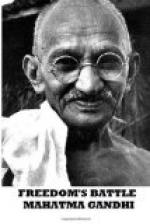He had hesitation in accepting Swadeshi as a plank in non-co-operation. To him Swadeshi was as dear as life itself. But he had no desire to smuggle in Swadeshi through the Khilafat movement, if it could not legitimately help that movement, but conceived as non-co-operation was, in a spirit of self-sacrifice, Swadeshi had a legitimate place in the movement. Pure Swadeshi meant sacrifice of the liking for fineries. He asked the nation to sacrifice its liking for the fineries of Europe and Japan and be satisfied with the coarse but beautiful fabrics woven on their handlooms out of yarns spun by millions of their sisters. If the nation had become really awakened to a sense of the danger to its religions and its self-respect, it could not but perceive the absolute and immediate necessity of the adoption of Swadeshi in its intense form and if the people of India adopted Swadeshi with the religious zeal he begged to assure them that its adoption would arm them with a new power and would produce an unmistakable impression throughout the whole world. He, therefore, expected the Mussalmans to give the lead by giving up all the fineries they were so fond of and adopt the simple cloth that could be produced by the manual labour of their sisters and brethren in their own cottages. And he hoped that the Hindus would follow suit. It was a sacrifice in which the whole nation, every man, woman and child could take part.
RIDICULE REPLACING REPRESSION
Had His Excellency the Viceroy not made it impossible by his defiant attitude on the Punjab and the Khilafat, I would have tendered him hearty congratulations for substituting ridicule for repression in order to kill a movement distasteful to him. For, torn from its context and read by itself His Excellency’s discourse on non-co-operation is unexceptionable. It is a symptom of translation from savagery to civilization. Pouring ridicule on one’s opponent is an approved method in civilised politics. And if the method is consistently continued, it will mark an important improvement upon the official barbarity of the Punjab. His interpretation of Mr. Montagu’s statement about the movement is also not open to any objection whatsoever. Without doubt a government has the right to use sufficient force to put down an actual outbreak of violence.
But I regret to have to confess that this attempt to pour ridicule on the movement, read in conjunction with the sentiments on the Punjab and the Khilafat, preceding the ridicule, seems to show that His Excellency has made it a virtue of necessity. He has not finally abandoned the method of terrorism and frightfulness, but he finds the movement being conducted in such an open and truthful manner that any attempt to kill it by violent repression would not expose him not only to ridicule but contempt of all right-thinking men.




